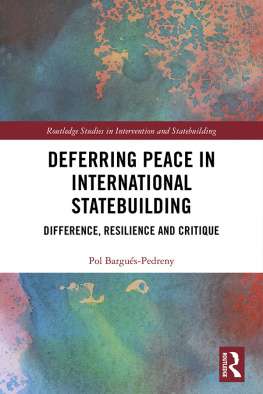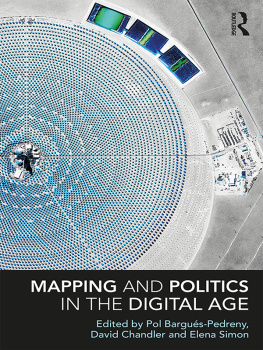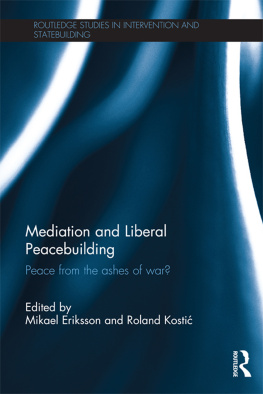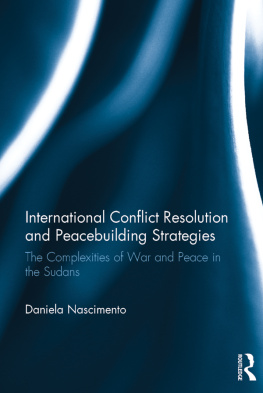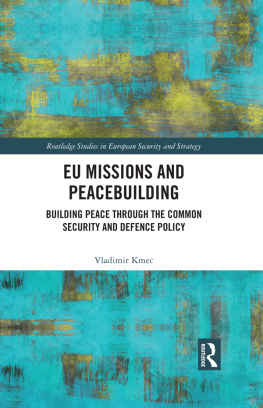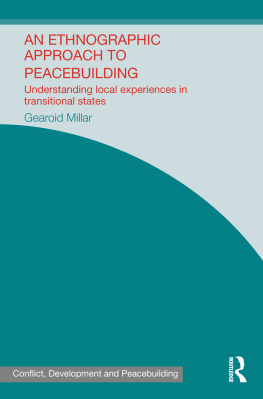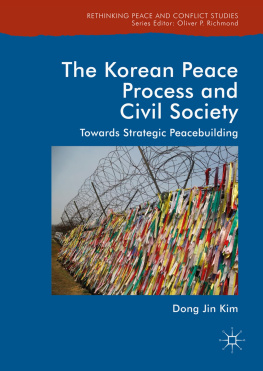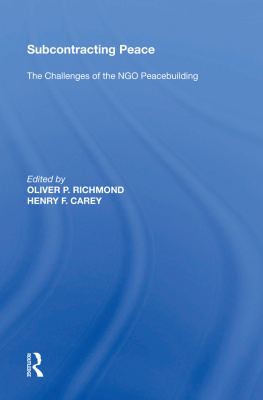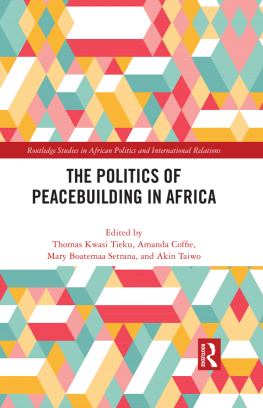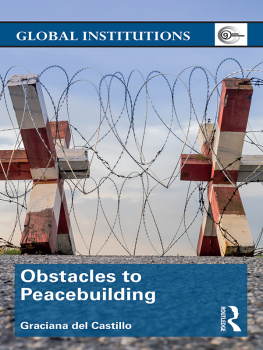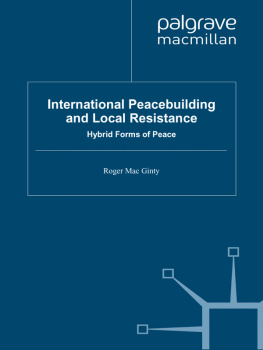Deferring Peace in International Statebuilding
This book explores the last 25 years of international peacebuilding and recasts them as a growing crisis of confidence in universal ideas of peacebuilding and self-government.
Since current peacebuilding interventions are abandoning domineering, top-down and linear methodologies, and experimenting with context-sensitive, self-reflexive and locally driven strategies, the book makes two suggestions. The first is that international policymakers are embracing some of the critiques of liberal peace. For more than a decade, scholarly critiques have pointed out the need to focus on everyday dynamics and local initiatives and resistances to liberal peace in order to enable hybrid and long-term practice-based strategies of peacebuilding. Now, the distance between the policy discourse and critical frameworks has narrowed. The second suggestion is that in stepping away from liberal peace, a transvaluation of peacebuilding values is occurring. Critiques are beginning to accept and valorise that international interventions will continuously fail to produce sensitive results. The earlier frustrations with unexpected setbacks, errors or contingencies are ebbing away. Instead, critiques normalise the failure to promote stability and peace.
This book will be of much interest to students of peacebuilding, international intervention, conflict resolution, international organisations and security studies in general.
Pol Bargus-Pedreny is a post-doctoral researcher at the University of Duisburg-Essen, Germany. His work explores debates on international intervention and critique in International Relations.
Routledge Studies in Intervention and Statebuilding
Series Editors: Aidan Hehir and Nicolas Lemay-Hbert
Founding Editor: David Chandler
The series publishes monographs and edited collections analysing a wide range of policy interventions associated with statebuilding. It asks broader questions about the dynamics, purposes and goals of this interventionist framework and assesses the impact of externally-guided policy-making.
The International Community and Statebuilding
Getting its act together?
Edited by Patrice C. McMahon and Jon Western
The Politics of International Intervention
The tyranny of peace
Edited by Mandy Turner and Florian P. Khn
Local Legitimacy in Peacebuilding
Pathways to Local Compliance with International Police Reform
Birte Julia Gippert
The Practice of Humanitarian Intervention
Aid workers, agencies and institutions in the Democratic Republic of the Congo
Kai Koddenbrock
Peace Figuration after International Intervention
Intentions, events and consequences of liberal peacebuilding
Gzim Visoka
Statebuilding in the Middle East and North Africa
The Aftermath of Regime Change
Irene Constantini
Deferring Peace in International Statebuilding
Difference, Resilience and Critique
Pol Bargus-Pedreny
For more information about this series, please visit: www.routledge.com/Routledge-Studies-in-Intervention-and-Statebuilding/book-series/RSIS
Deferring Peace in International Statebuilding
Difference, Resilience and Critique
Pol Bargus-Pedreny
First published 2018
by Routledge
2 Park Square, Milton Park, Abingdon, Oxon OX14 4RN
and by Routledge
711 Third Avenue, New York, NY 10017
Routledge is an imprint of the Taylor & Francis Group, an informa business
2018 Pol Bargus-Pedreny
The right of Pol Bargus-Pedreny to be identified as author of this work has been asserted by him in accordance with sections 77 and 78 of the Copyright, Designs and Patents Act 1988.
All rights reserved. No part of this book may be reprinted or reproduced or utilised in any form or by any electronic, mechanical, or other means, now known or hereafter invented, including photocopying and recording, or in any information storage or retrieval system, without permission in writing from the publishers.
Trademark notice: Product or corporate names may be trademarks or registered trademarks, and are used only for identification and explanation without intent to infringe.
British Library Cataloguing-in-Publication Data
A catalogue record for this book is available from the British Library
Library of Congress Cataloging-in-Publication Data
A catalog record for this book has been requested
ISBN: 978-0-8153-8627-8 (hbk)
ISBN: 978-1-351-17498-5 (ebk)
Typeset in Times New Roman
by Wearset Ltd, Boldon, Tyne and Wear
For Concepci, Josep, Blai and Bet
Contents
Acknowledgements
This book has benefitted greatly from the insights and expertise of many people that I have listened to in parks, cafeterias and saloons, as well as in workshops, seminars, conferences and classrooms. I wish to thank the people I met in the Department of Politics and International Relations at the University of Westminster, where the main ideas for this book sprang. Thanks to Dibyesh Anand, Paulina Tambakaki, Thomas Moore and Suzy Robson. Also to David Chandler, Aidan Hehir and Vanessa Pupavac, whose audacious suggestions and fair critiques will accompany me forever. And thanks to the PhD community for making the grey days in the office amusing, for their unconditional help and friendship all these years: Jessica Schmidt, Ana E. Carballo, Elisa Randazzo, Rob Cowley and Tom Mills.
I would also like to thank the people from the Institute for Development and Peace, where this book started gaining the current form. Thanks to Tobias Debiel and Cornelia Ulbert for giving me time for writing, feedback and unlimited support. I also worked with and got priceless comments and generous advice from Peter Finkenbusch, Christian Scheper, Patricia Rink and Stephan Trappe.
I wish to thank those who I met in the Centre for Global Cooperation Research, where the last words of the book have been written. Frank Gadinger and Katja Freisteins comments and help have always been worthwhile. I also mention Alejandro Esguerra, Olivia Rutazibwa, Mario Schmidt, Kai Koddenbrock, Volker Heins, Christine Unrau, Ina Kerner, ngela Surez-Collado, Jonathan Joseph, Susanne Buckley-Zistel, Morgan Brigg, Isaline Bergamaschi, Mathieu Rousselin and Xavier Mathieu, as our discussions were always gratifying. Other people have provided valuable ideas and feedback over the years: Nick Lemay-Hebert, Marta Iiguez de Heredia, Louise Wiuff Moe, Jelena Obradovic, Mara Martn de Almagro, Etleva Malushaj, Ignasi Torrent Oliva and Cian ODriscoll. I would also like to thank the editor at Routledge, Andrew Humphrys, the reviewers of the book and the language editor, Jonathan Merrett. Thanks also to my students for their interesting and sceptical questions about humanitarianism. Many thanks to all the people I interviewed and talked to in Bosnia and Kosovo, while I was doing field research.
Thanks to Patufets for their unwavering support, to Tribuneros for promising to buy copies of the book and to Albert Kuhn and Xavi Romero for showing me the way to Troy. Special thanks to my family, Joana, Camilo, Annas, Pep, Marc, Josse, Alberts, Gens, little Pol, Marias, Josep, Concepci and Blai, for providing direction to the book. And thanks, above all, to Bet for every word and vision.

